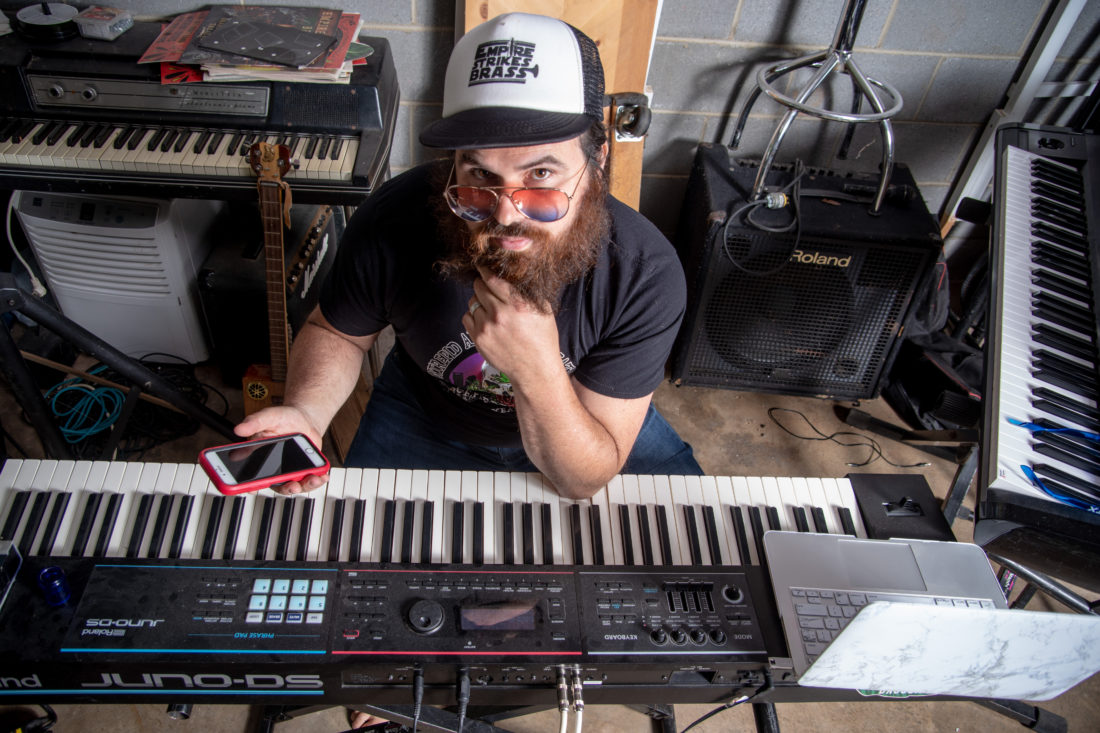Some self-employed area residents have found a new occupation after the coronavirus pandemic shut down their businesses: applying for unemployment benefits.
The job requires long hours on the telephone, internet or both, as well as the ability to deal with paperwork, bureaucracy and uncertainty about when or whether a check might arrive. No previous experience is required.
“I have put in over 60 hours (applying for unemployment) for myself, and I’ve put in probably 15 to 20 hours helping other people through the process,” says Lenny Pettinelli, a keyboard player who has become an “unemployment whisperer” of sorts for local musicians.
People can apply with the N.C. Division of Employment Security online, but, “If you answer any one of these questions incorrectly … you have no choice but to call them,” Pettinelli says.
When Pettinelli did that, “Nine times out of 10, they say that the call volume is so exceptionally high and the hold queue is full and so they hang up on you. … It’s just very, very, very hard to get any kind of human assistance.”
Like most states, North Carolina was unprepared when unemployment claims skyrocketed as COVID-19 cases shut down large swaths of the state’s economy.
The state’s unemployment program had not previously covered people who are self-employed and had to wait for guidance from the federal government on how to implement the benefits funded by a COVID-19 relief bill that passed March 27. The state said it was not ready to accept applications for benefits from self-employed workers until April 24. The number of Division of Employment Security workers funded by an unemployment insurance tax on employers fell by 16.5% during the last half of last decade, DES chief financial officer Kevin Carlson told a legislative committee in February.
The program was not especially robust to begin with after cuts imposed in 2013 to repay a roughly $2.6 billion debt that the fund used to pay benefits owed the federal government at the time. In the third quarter of 2019, the average weekly benefit workers got was $264, 41st among the states, and the average duration of benefits was 8.6 weeks, ranking North Carolina 49th, General Assembly staffers told the Joint Legislative Oversight Committee on Unemployment Insurance.

Despite more than tripling the number of workers handling claims, state officials have acknowledged that the Division of Employment Security has struggled to deal with the crush of applications. DES was getting about 370 claims a day in early March but has averaged more than 20,000 daily since March 15. About 464,000 of the 1.1 million people who have applied for unemployment benefits since then have received a payment, DES says.
Here’s how some local self-employed workers have navigated the unemployment benefits process and the larger challenge of making ends meet during the economic downturn:
Sarah Spagnuolo
The hairdresser from Barnardsville rents space to work in a salon near downtown Asheville. She applied for benefits after the salon shut down, and her husband, a self-employed construction worker, also had to quit working. The couple have three children.
Spagnuolo may have applied before the state was ready to accept her application, but now she says it won’t even take her calls. Whenever she has logged into her DES account over the past month, she is told she has four pending issues to be resolved. She says she has called “50 to 75 times and been (able) to talk to a human three of those times.”
During the application process, she was asked to send copies of her driver’s license and Social Security card. “They never received it. That makes me wonder who has my supersecret personal information,” she said.
Spagnuolo and her husband cut out cable TV and other expenses, tapped savings, postponed payment on a car loan and received food stamps. She is selling some of her stock of hair coloring to clients to use at home, which helps now but will make it harder to restart her business later. Some clients who canceled appointments sent her checks for the amount they would have paid.
She misses her clients and says, “I love cutting hair. Trust me, I don’t want to be on unemployment.” But she has declined entreaties to work surreptitiously.
“I have clients offering to pay me double and triple to just come and put color on their hair,” she says. One said Spagnuolo could cut the hair of everyone in the house, but Spagnuolo responded that social distancing “is something we’re doing to benefit the community” and declined. She could lose her cosmetology license and be charged with a misdemeanor if she works while prohibited by executive orders from Gov. Roy Cooper.
Lenny Pettinelli
If James Brown hadn’t already claimed the title, Pettinelli would be a contender to be called the hardest-working man in show business. He set a personal record last year by playing 344 gigs, some solo, some with Asheville-based band Empire Strikes Brass, and was on a pace to play still more in 2020.
He played keyboards at a local resort on Mondays, in a bar house band on Tuesdays, a restaurant on Wednesdays, a brewery on Thursdays and often doubled up on gigs on the weekend.
All of those gigs dried up over the span of just a few days in March. “I was freaked out. I was like, ‘Oh my God, what are we going to do?’ I’ve got a young, nearly 3-year-old daughter. My wife and I bought a house in Candler in 2017.”
Pettinelli did get his jobless benefits recently, but his wife, a self-employed massage therapist, is still waiting. He says he is not mad at the state government over the hours he spent dealing with DES.
“There’s just that learning curve, and completely changing a government system, that can’t be easy,” he says.
He also received help from a national fund set up by the Recording Academy to aid musicians, MusiCares, and did an online fundraiser for his birthday to return the favor. Pettinelli says he and his wife are OK financially for now, and he has enjoyed being home to put his daughter to bed at night, but he worries about the future.
Some venues may close, and crowds will be slow to return to those that do reopen, Pettinelli predicts.
“They can say it’s legal to gather and they can say it’s legal to open things back up, but people aren’t going to be comfortable going back out until we have ways to keep this thing at bay,” he says.
Victoria McFall
With weddings all but shut down, Waynesville-based wedding photographer Victoria McFall has sold landscape photos and gift cards for photo shoots and receives small payments for editing cellphone photos that people email her.
She hasn’t gotten any unemployment money. The state website typically times out or crashes when she gets online to apply.
McFall, a single mother of 6-year-old twin girls, says she has not been able to replace most of her income but has been able to pay her bills so far, thanks in part to an understanding landlord and a deferral of payments on her car loan.
Like Pettinelli, she worries about what will happen next. The crush of work and resulting revenue now and in the fall usually carry her and her business, Victoria Grace Photography, through the slow winter season.
Income from maternity and graduation photo shoots she might be doing now is lost forever, she says. Most couples are postponing weddings until later in the year or spring of 2021. That might not sound so bad at first, but it still represents some lost income, says McFall. There are only so many weddings she will be able to photograph next spring.
If COVID-19 worries prompt couples to postpone weddings now planned for the fall or to just get married at the courthouse, McFall says, “I’m really not sure how we’ll be able to sustain in winter.”




Before you comment
The comments section is here to provide a platform for civil dialogue on the issues we face together as a local community. Xpress is committed to offering this platform for all voices, but when the tone of the discussion gets nasty or strays off topic, we believe many people choose not to participate. Xpress editors are determined to moderate comments to ensure a constructive interchange is maintained. All comments judged not to be in keeping with the spirit of civil discourse will be removed and repeat violators will be banned. See here for our terms of service. Thank you for being part of this effort to promote respectful discussion.